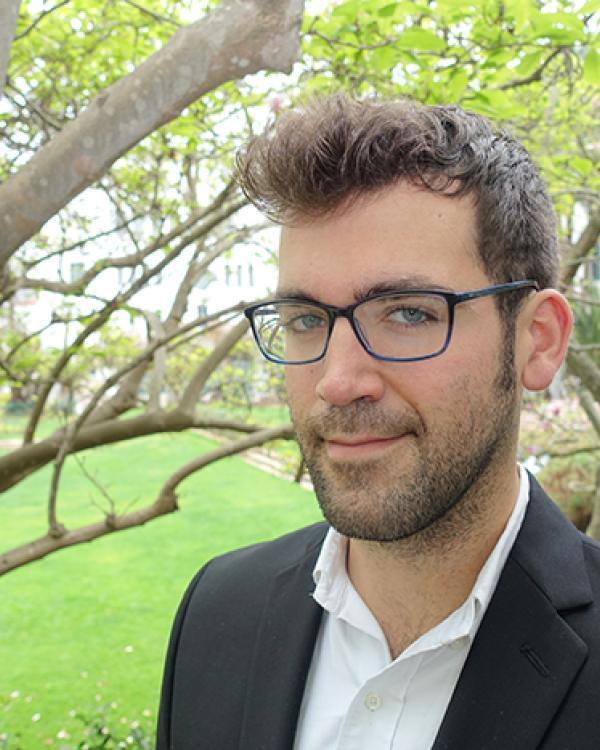
Jacob Kirksey will be graduating with a Ph.D. from the Department of Education at the Gevirtz School. He is both a National Science Foundation Graduate Research Fellow and an American Educational Research Association Fellow. In the fall, he will be joining the faculty at Texas Tech University as an Assistant Professor of Educational and Leadership Policy.
GGSE: Tell us about your research projects. What are your research interests, and why are they important to you?
Kirksey: My scholarship is focused on who is left out in education policy decisions. I employ causal inference techniques using datasets from school districts, government agencies, and my own primary data collection. My research agenda concerns three populations in education policy: student who miss school, students with disabilities, and students subject to the ripple effects of immigration enforcement. Permeating each of these areas of research, I am interested in the role of teachers in supporting these groups and how policy impacts extend into Science, Technology, Engineering, and Math (STEM) fields.
My work stresses a holistic approach to policymaking by drawing attention to individuals who were not considered in education policy adoptions by identifying the intended and unintended consequences. This consideration in policy strikes a balance between mitigating the potential for policy backfire, maximizing intended benefits, and fostering win-win education policies designed to reduce inequity in schools.
GGSE: If you could give us one piece of information that you wished every person knew and remembered about your research, what would it be?
Kirksey: My research is grounded in the fact that policymakers have a long history of responding to populations in need of educational support (e.g. students who have disabilities, are culturally and linguistically diverse, belong to low-income households). Policymaking occurs within political and financial constraints, and policies are implemented in ever-changing educational contexts. As a result, policymakers make decisions about which populations should be impacted, in what ways, and to what extent. In looking at my research agenda, I hope that people are convinced that researchers need to examine how changes made to schools interact with populations outside policymakers’ intended scope, because if not, this leaves a gap with potential to produce unintended consequences.
GGSE: What’s next? What do you hope to do after earning your Ph.D.?
Kirksey: Starting this fall, I will be joining the faculty at Texas Tech University as an Assistant Professor of Educational Leadership Policy. This is the dream!
GGSE: What piece of advice would you pass on to future students in the Gevirtz School?
Kirksey: There are two big things I learned that I wish I would have known from the beginning. One, I think graduate students (and some faculty) pride themselves on, whether it’s the perception or the reality, that they work all of the time. In my experience, the individuals who produce the best work are those who understand the balance between their professional and personal lives. You don’t need to work 60+ hours a week to be successful in the graduate program.
The second piece of advice is to know that imposter syndrome WILL hit you at various points throughout the program. But remember, you were admitted to the program for a reason. The hardest part is convincing yourself that you do belong, and all students have moments where they feel like they are on top of the world and when they aren’t good enough. Cherishing the moments when you feel the best will get you through the moments when you are feeling low.
GGSE: Is there anyone in the Gevirtz School that you would like to thank?
Kirksey: My dissertation committee members were a dream team. Michael Gottfried, Carolyn Sattin-Bajaj, Tine Sloan, and Hunter Gehlbach (recently moved to Johns Hopkins from GGSE) are incredible scholars and overall human beings. I am eternally grateful for their unconditional support. I also want to thank Karen Nylund-Gibson and Jill Sharkey for providing teaching and learning opportunities over the last two years.
GGSE: What is one of your favorite memories of your graduate school experience?
Kirksey: I will always remember the trolley ride with faculty and other graduate students the summer GGSE hosted a summer institute for a few students from Florida A&M University. Maybe I was living up the Santa Barbara life a bit too much, but because of that trolley ride, I was referred to us the guy with all the wine tasting and happy hour recommendations for years.
GGSE: In lieu of an in-person ceremony, how will you be celebrating your graduation?
Kirksey: Champagne, Santa Barbara wine, and small groups of friends.